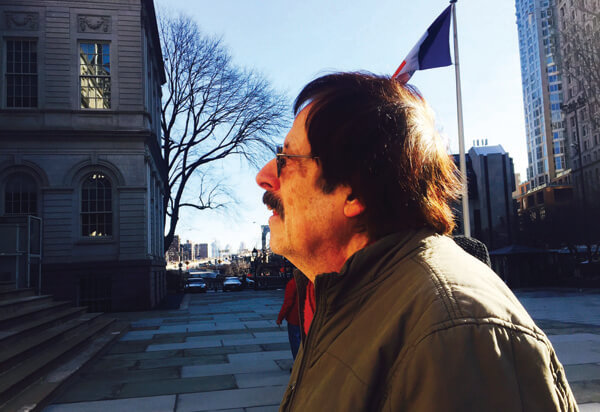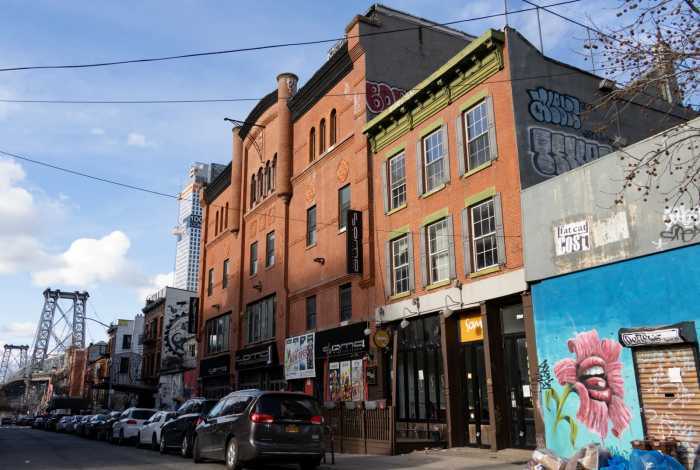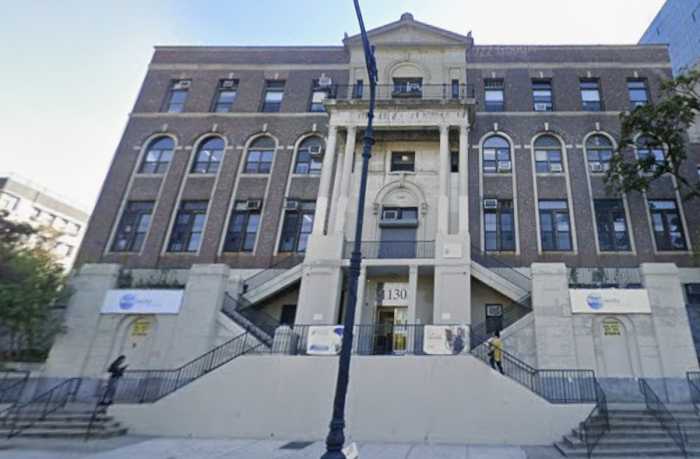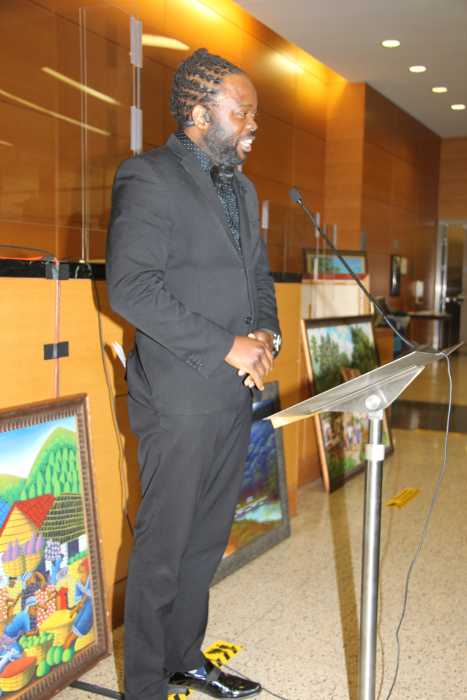Maria de Los Angeles reads “Who Am I?” as poets Alan Kaufman and Tom Savage look on. | ALICE ESPINOSA-CINCOTTA
BY PUMA PERL | On November 9, 2016, I woke up numb. Then I wrote a poem. Social media exploded with rage and argument. My Texas poet buddy Justin Booth and I made a pact to post poems, lyrics, and quotes. Diane di Prima. Amiri Baraka. Bad Brains. I sought to commune with other artists.
Quoting the early 19th century English poet Percy Shelley, Hoboken poet Danny Shot said, “Poets are the unacknowledged legislators of the world,” and then added, “In this time of potential darkness, we will have to work that much harder to bring light into the world.”
Poets Protest Against Trump, a nationwide action that took place this past weekend, was definitely a light force. Alan Kaufman, novelist, memoirist, and poet, organized the event “as a result of my own shocked disbelief at this election. My response to fear has always been to act in defiance of it. The greater the fear, the larger the action. I needed someone with an existing organization in place, and contacted Michael Rothenberg of 100 Thousand Poets For Change, asking him to join me in rallying the nation’s poets to rise up. Together, we contacted poets from New York to San Francisco and in no time poet protests sprang up in cities and towns across the US — from Austin to Chicago, San Francisco to Oakland, St. Louis to New Orleans.”
Poets Protest Against Trump draws resistors nationwide
“I feel that it is my job to do what I can to enable and empower all of these poets and artists’ actions,” Rothenberg told me, “and to bring our resources together. We must move away from empire building and toward unity.”
On January 15, a group of poets gathered at 1 p.m. on the front steps of City Hall. Kaufman opened the reading with his poem, “Let Us,” dedicated to “the poets of January 15 and the women of January 21,” who will gather in Washington and nationwide to protest Donald Trump’s inauguration. After his reading, Kaufman invited people to “just jump in.” In freewheeling fashion, everyone got the chance to offer his or her unique perspective.
Maria de Los Angeles, a visual artist, brought a poem, “Who Am I?”
“I am here with words to show diversity,” she said. “We are a diverse country that is fictionalized as white. It has never been white.”
When you see me, what do you see? I feel like an Undocumented artist…. But I see an American who is Free.
Queens resident Ron Kolm, a founder of the Unbearables, a collective of underground artists and writers, provided a humorous note in “Hitler Was Wrong (And Donald Trump Is Too).” He shared with me his theory that Hitler came to power due to his resemblance to Charlie Chaplin, and sees a similarity in Trump’s election.
There probably Wouldn’t have been A Bill Clinton Without Elvis, Or a Donald Trump/ Without the Terminator.
Another Unbearables founder, Jim Feast, presented a new work never before read: “Trump Regnant”:
Trump lay sleeping on a burning bed, not aroused ‘til flames touched his head. He leapt to the floor, his hair aflame, looking both for water and for someone to blame.
Poet/ performer love I.E.D. provided a change of pace in the rhythm and musicality of his piece, “dex”:
More bars more stars, more bars more scars
so the few can sip on their pinot noirs,
on their decks built upon the bodies of the dark-skinned … the more people you put behind bars the more blood you put in your cars
“It’s important that we gather in these spaces so we see each other’s faces, smell each other’s bodies, touch each other,” he said. “This is how we keep politics real. We realize through dance, poetry, painting, and song, that our emotions are not wholly private, but shared with others, the very medium through which we communicate and move from solipsism to solidarity.”
Nancy Mercado’s poem “I Told You” included a refrain that exemplified her concerns.
“Writers can, and often do, pose a threat to such regimes as they expose their unscrupulous practices,” she noted. “As Trump’s political apparatus becomes reality, writers and poets who document these times will be of great importance. It remains to be seen whether their work will be met with paying the ultimate price.”
I told you that McCarthy Would miraculously Come back from the dead
Ron Kolm, a co-founder of the collective the Unbearables, listens to other poets take their turn on the steps of City Hall. | PUMA PERL
Danny Shot provided an interesting piece called “Mr. Know It All,” consisting of a series of paragraphs addressed to the title figure.
Dear Mr. Know It All, How long am I allowed to grieve?
The gathering was not large, but it was high-spirited with a sense of community –– and knowledge that similar readings were taking place across the nation. Kaufman expressed satisfaction with the outcome.
“This was a great cross section of poetry representing many demographics,” he said. “This is just the beginning. We must keep organizing and build a collective sense of community so that people do not feel alone.”
From City Hall, some performers headed up to a PEN America event held on the steps of the New York Public Library at Fifth Avenue and 42nd Street. WRITERS RESIST: Louder Together for Free Expression was organized as “a collective stand to defend free expression, reject hatred, and uphold truth in the face of lies and misinformation.”
Steve Dalachinsky, who read a particularly moving piece, “heavy sleep,” at the Poets Protest Against Trump gathering, said the PEN America event was larger, but that “both events were of equal weight in emphasizing the importance of fighting against a corrupt and dangerous government. Both put forth valuable messages and insights into what is happening or could happen in a Trump/ Republican-dominated world.”
That evening, I heard from my Texas friend, Justin Booth, who reported “a huge success” at a reading he organized at Austin’s Malvern Books, with poets there “vowing to continue their vigil, not wavering in calling Mr. Trump out on behaviors that are dangerous as well as dishonest.”
As love I.E.D. said in “dex,” the poem he performed:
we climb this ziggurat of bodies that reaches the sky we climb with harnesses made of flesh and rope made from human hair we climb sticking our fingers in the sockets of the skulls and using the ribs as toeholds we climb, we climb, we climb.




































